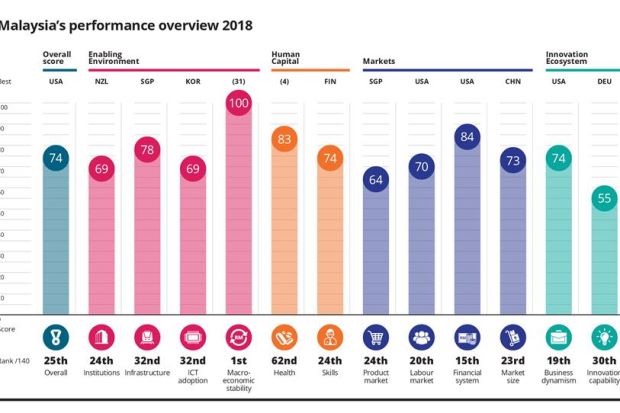Small gain in Malaysia’s Global Competitiveness ranking
PETALING JAYA: Malaysia moved up one notch to the 25th spot out of 140 countries in the World Economic Forum’s (WEF) 2018 Global Competitiveness Report (GCR).
This came after the nation gained 1.1 points to achieve an overall score of 74.4 points in the survey that rates economies based on 12 pillars, namely, institutions; infrastructure; information communications technology (ICT) adoption; macro-economic stability; health; skills; product market; labour market; financial system; market size; business dynamism; and innovation capability.
In the report that was published last week, Malaysia was one of the only three non-high-income economies featured in the Top 40.
The other two were China (28th) and Thailand (38th).
Within Asia-Pacific, Malaysia was ranked eighth most competitive.
We came in behind Singapore, Japan, Hong Kong, Taiwan, Australia, South Korea and New Zealand.
“Malaysia’s competitiveness, if maintained, would promote higher and sustained levels of income in the future,” the report said.
Notably, Malaysia was top in terms of macro-economic stability, with a perfect score of 100 points.
But there were 30 other countries too that shared the top billing in this category.
As for other pillars, Malaysia ranked 24th for institutions; 32nd for infrastucture and ICT adoption; 62nd for health; 24th for skills and product market; 20th for labour market; 15th for financial system; 23rd for market size; 19th for business dynamism; and 30th for innovation capability.
In terms of future-readiness, which GCR said is one of the keys to success in a changing world, Malaysia was ranked ninth globally.
According to the report, Singapore’s government is the most “future-ready”, followed by Luxembourg and the United States.
“Amid the transformations and disruptions brought about by the Fourth Industrial Revolution (4IR), adaptability and agility of all stakeholders – individuals, governments and businesses – will be key features in successful economies,” the report explained.
“How well countries adapt to 4IR will determine whether they ‘thrive’ or ‘stagnate’ and could further divide workforces and increase social tensions,” it noted.
The report pointed out that while the relationship between future-preparedness and income level was positive, the correlation was extremely loose, with Malaysia, for instance, scoring significantly higher than Greece, Italy and Belgium.
It said although Malaysia and Belgium have a similar global competitiveness index (GCI) score, Belgium’s median income was three times higher than Malaysia’s.
Overall, the US was named the most competitive economy in the world by the GCR – regaining its crown for the first time since the 2008 Global Financial Crisis.
This was followed by Singapore (second), Germany (third), Switzerland (fourth) and Japan (fifth).
At the other end of the scale, Haiti, Yemen and Chad were found to be the least competitive economies.
The report pointed out that the US came out top-three for seven of the 12 pillars, noting that the country’s entrepreneurial culture saw it score highly in the business dynamism pillar.
The world’s largest economy also scored highly for its labour market and financial system.
Meanwhile, Singapore, which is defined by its high score for openness – one of the main drivers of the country’s economic success – was featured in the top-10 of seven pillars.
The city-state is also in the top-20 of a further four.
Singapore took the lead in the infrastructure pillar with a near-perfect score of 95.7.
As for Germany, it is the highest placed European economy for competitiveness.
The report cited its particular strength in innovation capability, business dynamism and health.
Source: https://www.thestar.com.my/business/business-news/2018/10/18/small-gain-in-competitiveness/#JKiWULIluwYMDxko.99


 Thailand
Thailand




